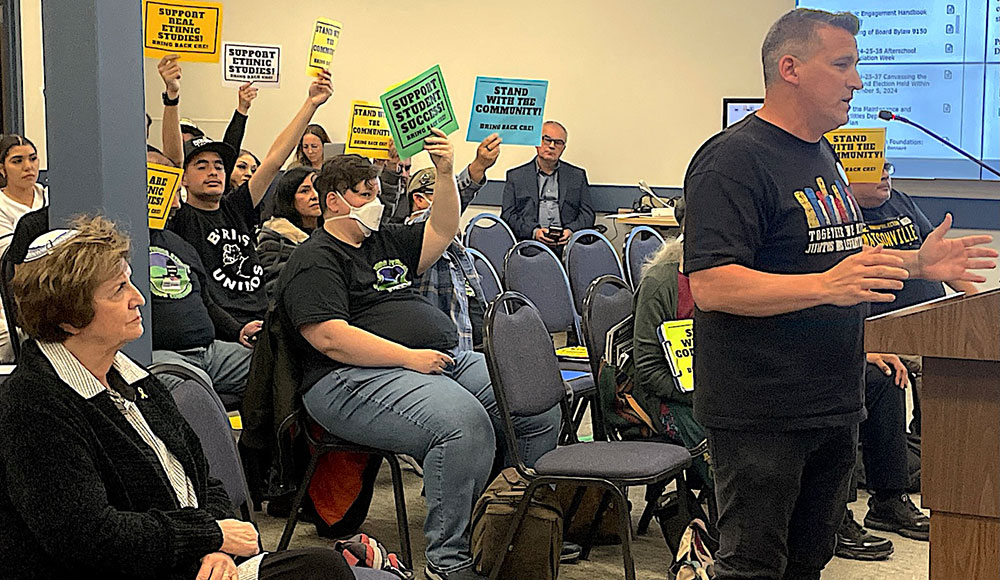Nearly two years after the Pajaro Valley Unified School District Board of Trustees voted to end the contract of a company providing ethnic studies training for teachers and administrators, an almost entirely new board unanimously agreed to reverse that decision Wednesday.
The one-year contract with Community Responsive Education (CRE)—and company founder Allyson Tintiangco-Cubales—will cost $90,000.
It will include the formation of an Ethnic Studies Site Leadership Group, along with a pedagogy—the method by which curriculum is taught—for teachers and administrators.
The trustees also approved one-year contracts with two other companies to develop its ethnic studies curriculum.
Ignacio Ornelas Rodriguez, a curriculum consultant from Campbell, will help the district incorporate local history and culture into its ethnic studies curriculum.
Ethnic studies has been a hot-button issue in PVUSD since October 2023, when the board rejected renewal of the contract with CRE, which had been in use at the district’s three comprehensive high schools since 2021.
The rejection dated back to a 2019 pilot ethnic studies curriculum that was developed for the California Department of Education, portions of which members of the Jewish community, educators and lawmakers deemed anti-semitic.
The state curriculum was scrubbed and rewritten, and the issue was addressed on Aug. 27, 2023 in a two-hour conference with prominent Jewish leaders, lawmakers and State Superintendent of Public Education Tony Thurmond.
During that conference, Sen. Scott Wiener, co-chair of the Jewish Caucus, said that “The original draft of the curriculum had some despicable language in it that was just straight-up anti-semitic.”
This publication has been unable to find the original draft of the state’s curriculum.
The Jewish News of Northern California reported that it “‘reflects an ‘anti-Jewish bias.’”
Additionally, the curriculum did not “meaningfully address anti-Semitism, is sharply critical of Israel, is supportive of the boycott, divestment and sanctions movement against Israel, and seems to use an anti-Semitic trope with the inclusion of a rap lyric that supporters of Israel ‘use the press so they can manufacture,’” the story said.
One of the authors of the rejected curriculum, Allyson Tintiangco-Cubales, who also created CRE, has repeatedly denied the allegations of anti-semitism, a claim backed by many of the people supporting the program.
The board’s decision sparked a firestorm of protest from the community, many of whom demanded in numerous meetings that the trustees reverse the decision.
But the Board declined to consider the demands and did not discuss the issue again until March 28, when the district held a study session on ethnic studies.
During the meeting, the trustees unanimously agreed to issue an apology to Tintiangco-Cubales on behalf of the district.
Teachers, students and community members have been coming to board meetings since to demand the program’s return.
“The CRE contract was already great just how it was,” said Pajaro Valley High School student Maximiliano Barraza. “Please respect the work that Tintiangco-Cubales has put into developing the CRE contract, and leave it alone.”
Gabriel Barraza, who has been coming to meetings for the past 20 months to try to get the trustees to reverse the decision, called the inclusion of the other contracts “alarming,” saying they are not strictly ethnic studies programs.
Instead, they call for civil discourse—an idea at odds with the concept of “deconstructing systems of power”—which he said is the core of ethnic studies.
“There is no compromising when it comes to real ethnic studies,” Barraza said.
“That’s what scares people in power, because when we seek to make a better world, we have to right the wrongs that exist today,” he said.
“Ethnic studies is about empowering communities of color that have been historically marginalized. It’s about empathy, it’s about building a world that is equitable.”
Watsonville history teacher Bobby Pelz said that the decision not to renew the contract was made without input from the teachers who were using the curriculum.
“I remember thinking that if they had just talked to me, I could have helped them understand,” he said. “I could have shown why this matters so much.”
Roz Shorenstein of Aptos—who has been an outspoken opponent of CRE—doubled down on accusations that it is anti-semitic. She said that she submitted letters from four local rabbis, the Simon Wiesenthal Center and the CAMERA Education Institute, all supporting the district’s previous decision.
Shorenstein also pointed out that Fresno Unified School District has rejected the CRE contract.
“I feel very strongly that the kids in public schools should not be exposed to political indoctrination in the classroom,” she said.
“…What kids should learn in ethnic studies is to appreciate the factual history of their complex identities and to respect others.”
Trustee Gabe Medina made a motion to censure former trustee Kim De Serpa—who was at the center of the vote to reject the contract—for making the decision without having sufficiently studied the issue.
That motion failed 4-3, with trustees Joy Flynn, Misty Navarro, Olivia Flores and Carol Turley dissenting,
In other action, the trustees approved a proposal to allow student trustees to make motions during meetings, a significant step in giving the non-elected board members more say in district governance. They still cannot cast votes or make motions on personnel issues.











